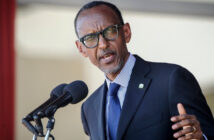Theresa May is set to become Britain’s next prime minister, lauded by her supporters as a safe pair of hands who can steer the country out of the European Union.
One of the most experienced members of the government, May favoured staying in the European Union, but her support during last month’s referendum campaign was qualified and low-key.
Since the vote, she has made clear that ‘Brexit means Brexit’. She will succeed David Cameron in a Conservative Party leadership race after energy minister Andrea Leadsom abruptly withdrew.
May is a daughter of a Church of England vicar, she studied geography at Oxford University, joining the Bank of England after her studies. She worked as a financial consultant at the Association for Payment Clearing Services (APACS) before becoming a lawmaker for Maidenhead, west of London, in 1997.
She became chairman of the Conservative Party in 2002, famously telling supporters at its conference that year that people saw them as “the nasty party”. She has been Home Secretary since 2010.
“I know I’m not a showy politician,” she said when she announced her bid to become prime minister in June. “I don’t tour the television studios. I don’t gossip about people over lunch. I don’t go drinking in parliament’s bars. I don’t often wear my heart on my sleeve. I just get on with the job in front of me.”
Here is her views on topical issues:
Brexit
“Brexit means Brexit. The campaign was fought, the vote was held, turnout was high, and the public gave their verdict. There must be no attempts to remain inside the EU, no attempts to rejoin it through the back door, and no second referendum.”
“I don’t think we should see people as Brexiteers and Remainers now. We have a job to do in making the best deal we can in coming out of the EU and I am very clear that I will deliver Brexit.”
On The Launch Of Article 50 Of The Lisbon Treaty
“There should be no decision to invoke Article 50 until the British negotiating strategy is agreed and clear – which means Article 50 should not be invoked before the end of this year.”
On EU Single Market, Trade And Freedom Of Movement
“We should make clear that for the foreseeable future there is absolutely no change in Britain’s trading relationships with the EU or other markets.”
“What’s important for us though, is that we get the right deal, and that’s a deal that is about controlling free movement, but it’s also about ensuring that we’ve got the best deal possible in trade, in goods and services.”
“I want to be clear that as we conduct our negotiations, it must be a priority to allow British companies to trade with the single market in goods and services – but also to regain more control of the numbers of people who come here from Europe.”
“I’m very clear that Brexit vote gave us a very clear message from people, that we couldn’t allow freedom of movement to continue as it had done hitherto.
“We need to bring control into movement of people coming into the UK from the EU… Still I believe we should have that goal of bringing immigration down to sustainable levels.”
Britain’s Economy
“We should no longer seek to reach a budget surplus by the end of the Parliament. If before 2020 there is a choice between further spending cuts, more borrowing and tax rises, the priority must be to avoid tax increases since they would disrupt consumption, employment and investment.”
“In the coming weeks I will set out (how) to take our economy through this period of uncertainty, to get the economy growing strongly across all parts, to deal with Britain’s long-standing productivity problem, to create more well-paid jobs, to negotiate the best terms for Britain’s departure from the EU and to forge a new role for ourselves in the world.”
On Defence And Nuclear Detterent
“A Conservative government I lead will make a strong defence an important priority. It is vital for our national interest that we maintain what is the most significant security and military capability in Europe – backed up by our commitment to spend 2 per cent of gross domestic product on defence.
“In particular, it is crucial that we maintain our independent nuclear deterrent. It would be sheer madness to contemplate even for a moment giving up Britain’s independent nuclear deterrent…
“We need a full fleet of four submarines, capable between them of providing what the military call ‘Continuous At Sea Deterrence’, or permanent, around-the-clock cover.”
Corporate Governance
“The FTSE (share index), for example, is trading at about the same level as it was 18 years ago and it is nearly 10 percent below its high peak. Yet in the same period executive pay has more than trebled and there is an irrational, unhealthy and growing gap between what these companies pay their workers and what they pay their bosses.
“I want to make shareholder votes on corporate pay not just advisory but binding. I want to see more transparency, including the full disclosure of bonus targets and the publication of ‘pay multiple’ data: that is, the ratio between the CEO’s pay and the average company worker’s pay.
“And I want to simplify the way bonuses are paid so that bosses’ incentives are better aligned with the long-term interests of the company and its shareholders.
“I also want us to be prepared to use – and reform – competition law so that markets work better for people. If there is evidence that the big utility firms and the retails banks are abusing their roles in highly consolidated markets, we shouldn’t just complain about it, we shouldn’t say it’s too difficult, we should do something about it.
“If I’m prime minister, we’re going to change the system- and we’re going to have not just consumers represented on company boards, but employees as well.”
Tax
“It doesn’t matter to me whether you’re Amazon, Google or Starbucks, you have a duty to put something back, you have a debt to your fellow citizens, you have a responsibility to pay your taxes. So as prime minister, I will crack down on individual and corporate tax avoidance and evasion.”
Productivity/Investment
“I want to see an energy policy that emphasizes the reliability of supply and lower costs for users. A better research and development policy that helps firms to make the right investment decisions.
“More Treasury-backed project bonds for new infrastructure projects. More house building. A proper industrial strategy to get the whole economy firing. And a plan to help not one or even two of our great regional cities but every single one of them.”
Foreign Corporate Takeovers
“Two years ago the Government almost allowed AstraZeneca to be sold to Pfizer, the US company with a track record of asset stripping and whose self-confessed attraction to the deal was to avoid tax. “A proper industrial strategy wouldn’t automatically stop the sale of British firms to foreign ones, but it should be capable of stepping in to defend a sector that is as important as pharmaceuticals is to Britain.”
Theresa May has Type One diabetes and needs insulin injections several times a day. She describes herself as a practicing Christian and says she owns over 100 cookery books. “I think it’s important that you are on top of things, you’re on top of your brief, you work hard in your brief. But I think if the view is that somehow that I was a control freak and that people didn’t get on and like my style, we wouldn’t have a majority of ministers who’re worked with me actually backing me for Prime Minister.”
“I like to keep my personal life personal. We couldn’t have children, we dealt with it and moved on. I hope nobody would think that mattered; I can still empathize, understand people and care about fairness and opportunity.”




